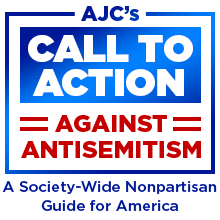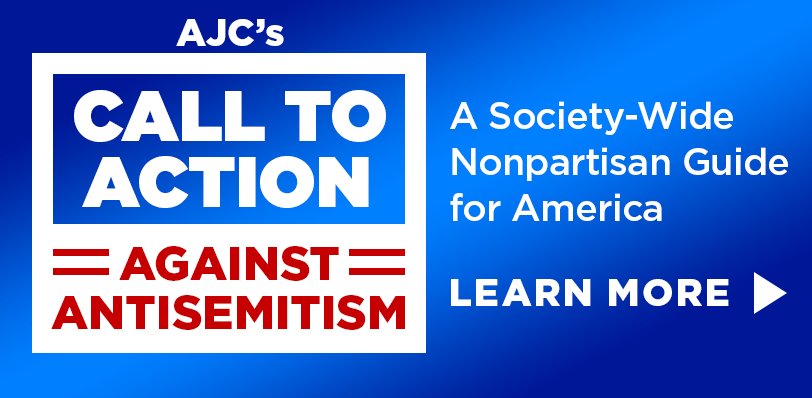The American Jewish community cannot fight antisemitism alone—it requires leaders and people of good faith, from religious, ethnic, and racial communities across the ideological spectrum, to join in the fight. Non-Jewish voices need to raise awareness that antisemitism is not just a Jewish problem, but an assault on the core values of pluralism, freedom, and democracy that Americans hold dear. Please note that the suggestions offered below are not exhaustive. There is always more that can be done.
Understanding Antisemitism
Recognize antisemitic tropes, stereotypes, and terms| AJC created the Translate Hate glossary to help identify different sources of antisemitism and expose antisemitic tropes, words, and symbols that often hide in plain sight. Part of being a strong ally is constant education. Translate Hate is a useful tool for new and longtime allies of the Jewish community.
Understand the Jewish connection to Israel | We also ask civil society to learn why Jews are so strongly connected to Israel. Judaism as a religion is integrally tied to the land, to the city of Jerusalem, and other holy sites. Jews are from Judea—the ancient name for Israel—and have lived continuously in the region for thousands of years; and, coming out of two millennia of persecution, not least the Holocaust, many Jews see Israel as the only place where they can live free from fear and persecution. An attack on Jews or their houses of worship because of their connection to or support of the Jewish state is a form of antisemitism. When Jews face double standards, like being asked for their position on the Israel-Palestinian conflict before being included in social justice causes when no other ethnic or religious group is asked about their connections to another country, that can be antisemitism.
Responding to Antisemitism
Support partners in need | AJC’s State of Antisemitism in America 2023 Report found that 92% of Americans believe antisemitism affects society as a whole, and yet, in many instances, Jews feel as though hatred of them is ignored, discounted, or not taken as seriously as other forms of hate and bigotry. When an antisemitic attack occurs, public messages of solidarity and support from partners are deeply appreciated. Partners speaking out loudly and clearly does not only engender goodwill toward the Jewish community, but it also raises vital awareness of hate in America more broadly. Those who hate Jews are likely to hate other minority groups, and pose a threat to our democracy. This also applies to online antisemitism where non-Jewish voices calling out blatant or subtle hate can prevent dissemination and highlight dangerous trends.
Use your platform | One of the most impactful ways partners can help in responding to antisemitism is to use their collective voice to raise awareness and show allyship through public statements or social media messages.
Preventing Antisemitism
Do not turn a blind eye | Leaders of religious, ethnic, and racial groups should refrain from amplifying antisemitic messages and avoid coalitions that exclude Jews, deny the right of Jews to self-determination in their ancestral homeland, or demonize the Jewish state. Anti-Israel statements and actions can be a form of antisemitism, and coalition partners should have a nuanced and balanced understanding of the State of Israel and the people who live there.
Raise awareness | Civil society is one of the most important factors in lowering the levels of antisemitism in the U.S. If civil society, including faith and ethnic leaders, decries all forms of antisemitism, does not ignore or minimize it, and pushes antisemites and those who express antisemitism to the fringes of society, America will be a safer place not only for Jews, but for everyone.
Acknowledge problems within one's own community | Non-Jewish voices have a unique ability to be heard when explaining what antisemitism is and why it is a societal problem. We are more likely to accept information when it comes from someone we know and trust. Learning about the various antisemitic tropes, triggers, and code words helps identify and address the specific instances and types of antisemitism that may arise within our own communities.
Strengthen education on Jews, antisemitism, and the Holocaust | The importance of education in the fight against hatred cannot be overstated. For coalition partners, learning about Jewish history and the societal problem of antisemitism can help develop a deeper understanding of Jews, their values, their fears, and the need for non-Jewish bystanders to not stay quiet in the face of Jewish attacks. This is why Holocaust education plays a critical role in better understanding where unchecked antisemitism can lead.
Include Jews in ethnic studies curricula | As coalition partners, work with the Jewish community to ensure lessons in schools include Jews, Jewish history and contribution to America, Jewish diversity, and contemporary antisemitism. Racism, antisemitism, and discrimination are an important part of our history, and our children should learn from our mistakes as we continue to strive to be a more perfect union.


